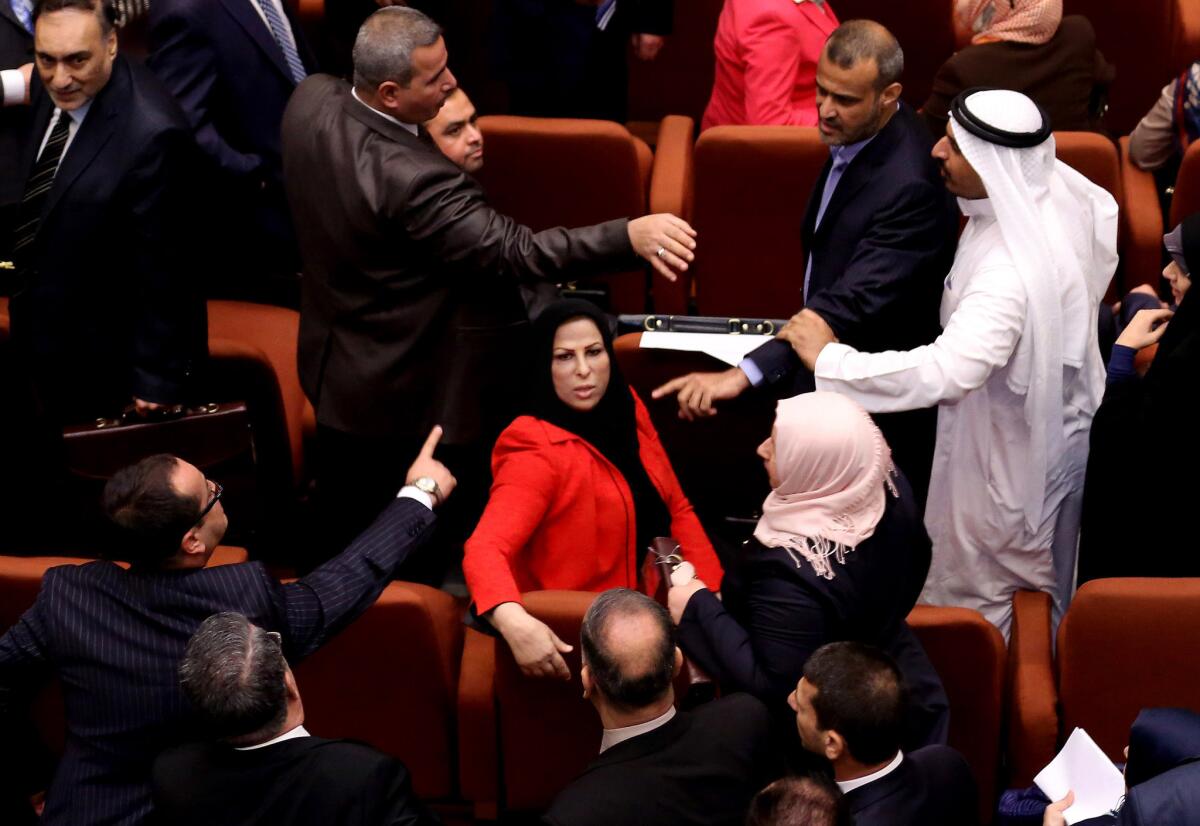Iraq parliament balks at resolving leadership crisis

- Share via
Reporting from Baghdad — Expectations that Iraq’s new parliament would soon resolve a leadership crisis were dashed Monday when deeply divided lawmakers pushed back a meeting scheduled for Tuesday.
Officials initially announced that the next parliamentary session had been put off until August, sparking an outcry about such a lengthy delay at a moment when the country faces severe political and security challenges.
The major item on lawmakers’ agenda is naming top officials of the new government, including the prime minister, president and speaker.
Hanging in the balance is the future of Prime Minister Nouri Maliki, the nation’s top elected official, who has vowed to seek a third term despite a concerted effort to oust him.
Late Monday, at least one lawmaker said an agreement had been reached to convene parliament next week. An announcement was expected Tuesday.
The squabbling highlighted the protracted nature of Iraq’s political stalemate at an extremely delicate moment. The country is enduring political paralysis as security forces of the Shiite Muslim-led government confront a Sunni-driven rebellion that has seen large swaths of Iraq fall under the control of an Al Qaeda breakaway group and its allies.
In another sign of the perilous state of affairs, Iraqi state media quoted an official in the Ministry of Communications as saying that Facebook and other social media sites had been blocked, along with data services through smartphones, “so as to help security in the country.”
The official did not elaborate. But the block went into place after an online video appeared last week featuring a sermon purportedly by Abu Bakr Baghdadi, head of the Islamic State, the Al Qaeda splinter group that is spearheading the antigovernment rebellion.
The militant advance has stalled outside Baghdad, but fierce fighting has been reported north and west of the capital. On Monday, the government announced that a senior army general had been killed in fighting west of the capital.
Maj. Gen. Nejm Abdullah Ali Sudani, commander of the 6th Division, was killed near the city of Fallouja, which is under the control of Sunni militants.
Also Monday, officials said that that six people, reportedly including four police officers, were killed when a suicide car bomb detonated at a checkpoint in the largely Shiite Kadhimiya district, home to a major Shiite religious shrine.
The Islamic State took responsibility for the attack in a message on Twitter.
Iraqi officials fear that Sunni militants could be planning a new wave of car bomb attacks targeting Shiite neighborhoods in the capital. Outside powers, including the United States, have called on Iraqi lawmakers to resolve the leadership impasse. Both Shiite and Sunni clerics have also urged parliament to end the leadership void.
Maliki faces considerable opposition in his bid for a third term. Critics say the prime minister, a member of the majority Shiite sect, has alienated minority groups, including Sunnis and Kurds, contributing to the security crisis and raising the prospect that Iraq will splinter along sectarian and ethnic lines.
Detractors also blame Maliki’s government for the collapse of security forces last month as Sunni militants seized a vast swath of northern Iraq, including the cities of Mosul and Tikrit. But Maliki’s supporters say the prime minister is the right man to lead Iraq against “terrorists” seeking to overthrow a democratically elected government.
Bulos is a special correspondent.
Follow @mcdneville for news from Iraq and Syria
More to Read
Sign up for Essential California
The most important California stories and recommendations in your inbox every morning.
You may occasionally receive promotional content from the Los Angeles Times.














